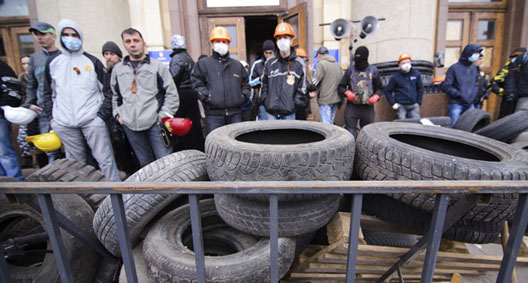
Masked Men in Web Video Called for Armed Uprising
Ukraine’s interim government is scrambling to respond to the seizures yesterday of government buildings in eastern provinces by organized groups of men who demanded the annexation of eastern Ukraine by Russia. President Oleksander Turchynov cancelled a visit to Lithuania and said the weekend attacks represent a Russian operation to overthrow the Ukrainian government. “The aim of this scenario is to divide Ukraine into parts and to turn part of Ukraine into a territory of slavery under a Russian dictatorship,” Prime Minister Arseniy Yatsenyuk said in Kyiv.
|
Former prime minister and presidential candidate Yulia Tymoshenko arrived in Donetsk, scene of one of the attacks, with the aim of calming the standoff.
About 100 men held the provincial government offices in Donetsk and proclaimed the creation of a Donetsk People’s Republic. They demanded the holding of a referendum on May 11 to ratify their proclamation and formally secede from Ukraine. Groups seized the Ukrainian security services office in Luhansk and another government building in Kharkiv, Ukraine’s second-largest city. All three cities are the capitals of provinces on the Russian border.
Russia’s government has claimed local ethnic Russian residents in eastern Ukraine have been subjected to Ukrainian oppression and that previous street protests in those cities have been by local residents. Ukrainian officials say the protests and attacks have been organized by Russia, with many of their participants being Russians who entered Ukraine to foment subversion. In Donetsk yesterday, a bearded spokesman for the men occupying the provincial government building declined to give his name, Reuters reported, and it was not clear what organization or group the men were affiliated with.
A signal for yesterday’s attacks appeared to have come on April 1 in a Russian-language video that surfaced on Ukrainian web sites. The video, posted anonymously, shows three masked men in military garb. One of them denounces Ukraine’s May 25 presidential elections and calls for a referendum on federalization. The speaker calls for an uprising on April 6, yesterday, if the demands are not met. He urges Russians in Ukraine to join demonstrations on that day, to come armed and to bring enough food for the day. He tells mothers that they should keep their children away from Ukrainian military installations on that day. Many responses in social media noted that the masked speaker spoke with a pronounced Russian accent.
The seizures of the government buildings in the east came a day after Ukraine said it had arrested 15 men armed with 300 automatic weapons, grenades and firebombs whom officials said were preparing to launch attacks in Luhansk.
The Ukrainian Security Service also reported detaining a Russian citizen on May 5, who was allegedly one of the coordinators of the anti-Ukrainian protests in Luhansk.
Alarmed residents of all three eastern Ukrainian cities reported seeing military aircraft in the sky this morning. Ukraine’s Defense Ministry explained that these are Ukrainian MIG 29 planes participating in aerial exercises which began March 1.
Ukraine’s interim government has said in recent weeks that Ukraine’s border guards had refused entry to Russians, sometimes hundreds per day, whom they suspected of filtering into Ukraine to cause or join incidents such as those yesterday. The secretary of Ukraine’s National Security Council, Andriy Parubiy, told the Atlantic Council in a webcast discussion March 27 that Russia was fomenting subversion through a campaign of attacks that he said had been code-named “Russian Spring.”
“First the government [administrative] buildings were to be captured, and then ‘people’s governors’ were to be proclaimed and then the ‘people’s governors’ were to call for Russia’s help,” Parubiy said. “Russia’s plan was to trigger a conflict and then show that the majority of the local people were supporting Russia, so that they would have a reason to intervene” through a direct invasion, he said.
Irene Chalupa covers East European affairs at the Atlantic Council.
Image: Pro-Russian protesters gather outside the regional administrative building, with automobile tires seen in the foreground, in the eastern city of Kharkiv April 7, 2014. REUTERS/Stringer
